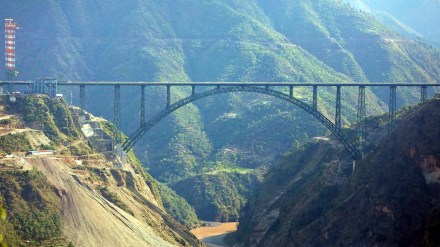Prime Minister Narendra Modi inaugurated several projects in Jammu and Kashmir on February 20, 2024, including the Chenab Bridge, the world’s highest single-arch railway bridge. This landmark achievement marks the successful culmination of what has been hailed as one of India’s most significant civil engineering endeavors in recent history.
Approved in 2003 and contracted in 2008, the construction of the single-arch bridge over the River Chenab in Jammu and Kashmir faced concerns regarding its safety and stability. However, after undergoing rigorous testing, the bridge has now become a testament to India’s engineering prowess.
Situated between Bakkal and Kauri in the Reasi district, the bridge forms a crucial link from Katra to Banihal. Standing at a height of 1,178 feet above the riverbed, it surpasses the iconic Eiffel Tower in Paris by 35 meters.
Part of the Rs 35,000 crore Udhampur-Srinagar-Baramulla Railway Link (USBRL) project, the Chenab Bridge alone incurred a cost of approximately Rs 14,000 crore. It is a pivotal component of the Ek Bharat Shreshtha Bharat initiative, aiming to enhance connectivity between Kashmir and other states.
The bridge has undergone extensive testing, including assessments for stability in high-velocity winds, extreme temperatures, earthquake resilience, and hydrological impacts. With an anticipated lifespan of 120 years, it can withstand winds up to 260 km/h.
The construction of the bridge, which took three years, utilised two massive cable cranes installed on both banks of the Chenab. Its completion signifies a significant milestone for the region, providing vital infrastructure for both civilians and the armed forces.
The project’s completion comes after a two-decade-long wait, with the bridge poised to revolutionize transportation and tourism in Jammu and Kashmir. Once fully operational, the Udhampur-Srinagar-Baramulla Rail Link Project, including the Vande Bharat Metro train, will further enhance connectivity and economic opportunities for the region.
Here are some key facts that you should know about the world’s highest single-arch railway bridge – The Chenab Bridge:
Location
The Chenab arch bridge spans between Bakkal and Kauri in the Reasi district of Jammu and Kashmir, providing a vital link from Katra to Banihal.
Height
Standing at an impressive height of 1,178 feet above the riverbed, it surpasses the iconic Eiffel Tower in Paris by 35 meters.
Project Scope
Part of the Rs 35,000 crore Udhampur-Srinagar-Baramulla Railway Link (USBRL) project, the bridge aims to enhance connectivity in Jammu and Kashmir, especially in challenging terrains and weather conditions.
Cost
The construction of the Chenab bridge alone incurred a cost of around Rs 14,000 crore.
National Initiative
Aligned with the Ek Bharat Shreshtha Bharat initiative, the bridge signifies efforts to strengthen connectivity between Kashmir and other states.
Safety Testing
Rigorous tests ensure the stability and safety of the bridge, including assessments for high-velocity winds, extreme temperatures, seismic resilience, and hydrological impacts.
Lifespan and Resilience
With an expected lifespan of approximately 120 years, the bridge is designed to withstand winds with speeds up to 260 km/h and is earthquake-resistant.
Approach Road
The bridge is complemented by a 2015 km long approach road, further enhancing its accessibility and usability.
Construction Process
Engineers worked tirelessly for three years to construct the arch of the bridge, utilising two massive cable cranes installed on both banks of the Chenab.
Strategic Importance
Beyond enhancing civilian connectivity and tourism, the railway line, including the Chenab bridge, holds significance for the deployment of armed forces in this strategically vital region.
Long-awaited Project
The completion of the bridge fulfills a two-decade-long wait for the people of Jammu and Kashmir, as the project faced delays since its initial approval in 2003.
Future Prospects
Once fully operational, the Udhampur-Srinagar-Baramulla Rail Link Project, including the introduction of the Vande Bharat Metro train, is poised to further transform transportation and connectivity in the region.
